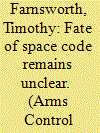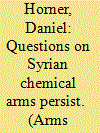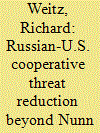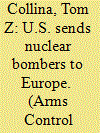| Srl | Item |
| 1 |
ID:
132785


|
|
|
|
|
| Publication |
2014.
|
| Summary/Abstract |
A new draft of the European Union's proposed international code of conduct for activities in outer space was released during a May 27-28 meeting in Luxembourg, but despite the revisions, it is unclear which countries will support the code.
"We are fully aware that [the current draft] does not meet the concerns and expectations of all," Jacek Bylica of the EU, chairman of the meeting, said in his closing remarks.
The meeting was the last of a series of three consultations that began in Kiev in May 2013 and continued in Bangkok in November 2013. The meetings represented an effort to expand the group of negotiating states beyond the established spacefaring countries. (See ACT, May 2013.) During the three meetings, officials from more than 80 countries met to discuss elements of a code, with many disagreements remaining throughout the process
|
|
|
|
|
|
|
|
|
|
|
|
|
|
|
|
| 2 |
ID:
132783


|
|
|
|
|
| Publication |
2014.
|
| Summary/Abstract |
Efforts to resolve several issues arising from Syria's chemical weapons program appear to be moving slowly, even as the destruction of Syrian chemical weapons material aboard a U.S. ship in the Mediterranean Sea began this month.
Officials from the Organisation for the Prohibition of Chemical Weapons (OPCW) and some of its key member states have highlighted the need for Syria to destroy its chemical weapons production facilities and resolve questions about its declaration of its arsenal last year.
For months, Robert Mikulak, the U.S. ambassador to the OPCW, has been castigating Syria for its failure to destroy its 12 remaining former chemical weapons production facilities. Destruction of such facilities is a required step under the Chemical Weapons Convention (CWC), which Syria joined last fall. Under a timetable for chemical weapons destruction approved by the OPCW Executive Council last November, that task was to be completed by March 15.
|
|
|
|
|
|
|
|
|
|
|
|
|
|
|
|
| 3 |
ID:
132782


|
|
|
|
|
| Publication |
2014.
|
| Summary/Abstract |
The crisis in Ukraine probably has ruined prospects for another formal Russian-U.S. arms control agreement during the Obama administration's second term. Even before the crisis over Crimea, Russian and U.S. negotiators differed sharply on their preferred outcomes for reducing their strategic nuclear forces further, eliminating or consolidating nonstrategic nuclear weapons in Europe, constraining national and theater strategic defenses, or renewing conventional arms limitations in Europe.
|
|
|
|
|
|
|
|
|
|
|
|
|
|
|
|
| 4 |
ID:
132789


|
|
|
|
|
| Publication |
2014.
|
| Summary/Abstract |
The U.S. Air Force sent five nuclear-capable bombers to Europe in early June as President Barack Obama traveled to the region to reassure allies against the backdrop of Russia's recent annexation of Crimea and separatist conflict in Ukraine.
All five bombers went to the air force base at Fairford in the United Kingdom. Two B-52 bombers from Barksdale Air Force Base in Louisiana and one from Minot Air Force Base in North Dakota arrived on June 4 for a two-week deployment, according to an Air Force press release. "Airmen will train and integrate with U.S. and allied military forces in the region," the Air Force said, adding that the bombers did not carry live weapons.
Four days later, two B-2 bombers based at Whiteman Air Force Base in Missouri flew to Fairford as well, the Air Force said. As the most sophisticated U.S. bomber for penetrating enemy air defenses, the presence in Europe of nuclear-capable B-2s was reported by media outlets as possibly sending a pointed message to Moscow.
|
|
|
|
|
|
|
|
|
|
|
|
|
|
|
|